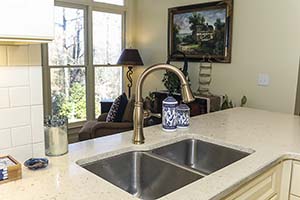
Proper care of your countertop will help prevent stains.
At the end of remodel projects, I am frequently asked about material upkeep and maintenance. Having the best hard surfaces in your home requires special care to maintain and preserve them. Based on your specific countertop material, it is important to use the right cleaning agents and procedures. These tips can be used whether you’ve remodeled recently or just want to keep your home looking fresh. But first, let’s look at the most common countertop materials.
Quartz is an engineered, or man-made material, that requires less maintenance than other stone surfaces due to its non-porous, sealed surface. In recent years, quartz has surpassed granite as the number one countertop material because of its low maintenance and durability. It also now comes in a large variety of colors and patterns that mimic other materials, like granite, marble, and concrete. Because quartz is engineered, there is no reason to reseal it like you would a natural stone. To clean, simply use a damp cloth with mild dish soap and warm water or a cleaner made for quartz, then dry with a clean microfiber cloth.
Granite is a natural stone that comes in tons of colors and patterns. It has been a popular choice for kitchens for decades now. But because it is a natural stone, it requires a little more care than quartz. It’s important to avoid leaving spills for prolonged periods on granite, as this may cause stains or discolor the counter due to its porous nature. To clean, use a damp cloth with mild dish soap and warm water or a cleaner made for granite regularly, then dry with a clean microfiber cloth. It is recommended to re-seal granite once or twice per year to protect against water spots and stains.
Marble is another natural stone that is very popular for kitchen and bathroom countertops right now, especially in higher-end homes. In fact, as mentioned a couple of months ago, statement marble is a trend for this year. It comes in a variety of colors and patterns created by mineral deposits from the area in which it was extracted. Marble is heat resistant, as well as resistant to chipping or cracking; however, it is very susceptible to stains and scratches. Like granite, it’s important to reseal marble at least once or twice per year. If you love the look of marble but do a lot of cooking or baking, or enjoy coffee or red wine, I typically recommend going with a marble-looking quartz for the same look, but less risk of damaging or staining your countertops.
Butcher Block is a natural wood countertop material that is made from a hard wood, like maple, walnut, teak, or ash. Butcher block has been used for a long time as a countertop material in kitchens. Do not use bleach or harsh chemicals as these may cause damage to the coloring or finish of the wood. To clean, reach for mild dish soap and a damp cloth. You can also use a cleaner specifically for butcher block. Additionally, if not oiled regularly, the wood will dry and split over time. Just make sure you use food-safe mineral oil or a butcher block specific oil/conditioner. Do not use vegetable oils such as olive or sunflower because it will eventually go rancid and not be safe for food surfaces. If the counter becomes irredeemably stained or unevenly worn, you can always sand, refinish and reseal it.
Laminate and solid surface countertops have been declining in popularity over the past couple decades because other materials, like granite, have become more budget-friendly. Laminate is still the cheapest countertop option though and popular with DIYers. Laminate and solid surfaces are resistant to stains, mold and mildew; however, they cannot stand up to heat and scratch easily. Cleaning is easy with mild dish soap and water or a non-abrasive multi-surface cleaner. Because both options are man-made, they don’t require any sealing.
Here are some important general tips for any countertop material:
- Always use coasters for drinks to prevent water stains and use trivets or potholders for hot pans to prevent drastic changes in temperature.
- Always use a cutting board to prevent scratches.
- Don’t use abrasive chemical cleaners, solvents, or brushes as this will weaken the sealant and your counter will become more susceptible to stains and damage.
- After you’ve cleaned your counter, dry it off with a fresh, dry microfiber cloth to help prevent water stains.
Keeping your countertops clean and protected is not only easy, but also very important in preserving the longevity of your surfaces, no matter the material.
Photo: courtesy of Tracy Tesmer Design/Remodel





